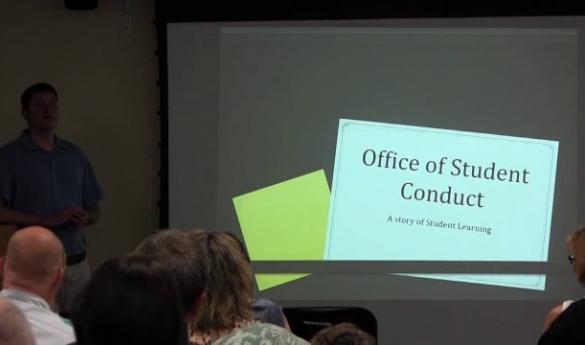Bill could allow students to have legal representation in conduct hearings
According to Mason’s current student code of conduct, students are not allowed to have a lawyer represent them during hearings with representatives from the Office of Student Conduct.
“Students may be accompanied in a disciplinary proceeding by an advisor of his or her own choosing and at his or her own expense,” reads the current code. “Advisors may only consult with the respondent and are not permitted to speak on the respondent’s behalf or address the hearing board or officer.”
According to university officials, Mason’s disciplinary process is designed to be more of an educational process than a legal proceeding.
“Our goal is to meet with students and to figure out what an educational response is to a poor decision,” said Brent Ericson, director of Mason’s Office of Student Conduct.
A proposed bill in the Virginia General Assembly could change that system to make certain student conduct hearings look more like court proceedings.
According to the bill’s text, the legislation “grants any student enrolled at a public institution of higher education who is accused of a violation of the institution's rules and regulations for the conduct of students that is punishable by a suspension of more than 10 days or expulsion the right to hire counsel.”
“This bill is to give students a voice in expulsion and suspension hearings and a right to due process which every parent should be concerned about,” said the bill’s patron, Delegate Rick Morris.
While the bill only applies to incidences where students could be suspended or expelled, Ericson believes the change would have an adverse effect on the relationship between students and the university.
“We work in an educational model and we want to get to know our students,” Ericson said. “Would that ever happen with someone speaking for you? It takes it from an educational process into a procedural criminal one.”
Proponents of the bill say that is exactly what should happen when there are serious allegations brought against students who do not have a right to legally represent themselves.
“The real genesis of it is that students are being kicked out of school for alleged crimes. It’s going on their transcripts so future places that they want to apply to are seeing that,” said Joe Cohn, policy director for the Foundation for Individual Rights in Education, a non-profit group based in Philadelphia. “It’s destroying careers. The imbalance is so stark. If you have a lawyer it levels the playing field.”
Supporters argue that students who are being charged with assault or other serious offense should be given a chance in due process, since they are likely to carry the charges throughout their career.
“The punitive effects from these University hearings can adversely affect the student for the rest of their life,” Morris said. “Providing students with equal rights and essential qualities of individual liberty and dignity, which should be a priority of our Commonwealth.”
Ericson is also concerned that allowing students to hire lawyers would discourage students from reporting incidences if they were not under the privacy of a conduct hearing.
“A lot of times students will opt to go through our process rather than a criminal one,” Ericson said.
Likewise, Ericson believes students would be at a disadvantage if they brought charges against another student who could afford a lawyer.
“If a student comes from means, doesn’t that inherently place a student at a financial disadvantage,” Ericson said. “I have a problem with that ethically and professionally.”
According to Ericson, there have already been 13 cases this semester that would qualify for students to have a lawyer present. Mason’s General Council are not involved in the hearing process with students, but play an advising role to the Office of Student Conduct.
“The larger question is here is how can we make it more fair when you enter into that process,” Cohn said. “In order to make it fair, you can’t prevent a student from having a lawyer.”
The bill is scheduled for the Virginia House Higher Education Subcommittee on Tuesday, February 4.
January 31, 2014: Correction: The original article stated that "according to Mason’s current student code of conduct, students are not allowed to have a lawyer present during hearings with representatives from the Office of Student Conduct." That is incorrect. Students are allowed to have a lawyer or advisor present, but they may not engage in the discussion. We regret the error.

